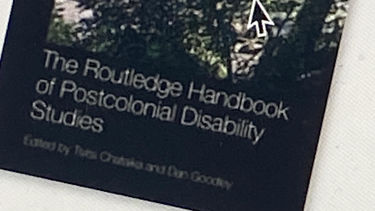The Routledge Handbook of Postcolonial Disability Studies has been published (March 2024). Led, curated and driven by Dr Tsitsi Chataika - with editorial input from iHuman's Dan Goodley - this exciting new text challenges the Western, European and North American tendencies of critical disability studies through centring and exploring postcolonial theory.
The edited volume explores issues of power, economics, politics, religion and culture and how these elements work in relation to colonial supremacy. It argues that disability is a constitutive material presence in many postcolonial societies and that progressive disability politics arise from postcolonial concerns. By drawing these two subjects together, this handbook challenges oppression, voicelessness, stereotyping, undermining, neo-colonisation and postcolonisation and bridges binary debate between global North and the global South.
The book is divided into eight sections
- Setting the Scene
- Decolonising Disability Studies
- Postcolonial Theory, Inclusive Development
- Postcolonial Disability Studies and Disability Activism
- Postcolonial Disability and Childhood Studies
- Postcolonial Disability Studies and Education
- Postcolonial Disability Studies, Gender, Race and Religion
- Conclusion
And comprised of 27 newly written chapters, this book leads with postcolonial perspectives – closely followed by an engagement with critical disability studies – with the explicit aim of foregrounding these contributions; pulling them in from the edges of empirical and theoretical work where they often reside in mainstream academic literature.
The book will be of interest to all scholars and students of disability studies and postcolonial studies as well as those working in sociology, literature and development studies.
More details can be found here


